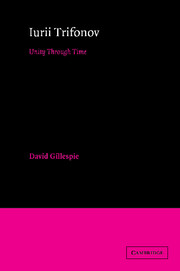Book contents
- Frontmatter
- Contents
- Preface
- Introduction
- 1 From Moscow students to the Turkmenian desert (Studenty; Utolenie zhazhdy)
- 2 Moscow life, 1966–1975 (Obmen; Predvaritel'nye itogi; Beskonechnye igry; Dolgoe proshchanie; Drugaia zhizn')
- 3 The house on the embankment (Dom na naberezhnoi)
- 4 Terrorism, Civil War and the present (Neterpenie; Otblesk kostra; Starik)
- 5 Time and place (Vremia i mesto; Ischeznovenie)
- Conclusion: unity through dislocation (Oprokinutyi dom)
- Notes
- Bibliography
- Index
- CAMBRIDGE STUDIES IN RUSSIAN LITERATURE
Introduction
Published online by Cambridge University Press: 22 August 2009
- Frontmatter
- Contents
- Preface
- Introduction
- 1 From Moscow students to the Turkmenian desert (Studenty; Utolenie zhazhdy)
- 2 Moscow life, 1966–1975 (Obmen; Predvaritel'nye itogi; Beskonechnye igry; Dolgoe proshchanie; Drugaia zhizn')
- 3 The house on the embankment (Dom na naberezhnoi)
- 4 Terrorism, Civil War and the present (Neterpenie; Otblesk kostra; Starik)
- 5 Time and place (Vremia i mesto; Ischeznovenie)
- Conclusion: unity through dislocation (Oprokinutyi dom)
- Notes
- Bibliography
- Index
- CAMBRIDGE STUDIES IN RUSSIAN LITERATURE
Summary
When Iurii Trifonov died suddenly on 28 March 1981 at the age of fifty-five following what should have been a routine kidney operation, he was at the height of his success as a writer, and one of the most discussed Soviet writers, both in the USSR and abroad. A quick glance at the bibliography at the end of this monograph confirms that even before his death there had been much critical discussion of his work, and evaluation and comment have continued unabated into the 1990s. On the whole, he has been treated with a mixture of indulgence, hostility and suspicion by Soviet critics, at least until his death, and considerable interest from Western and émigré critics in his narrative technique and the ‘half-truths’ about Soviet history and society he manages to convey. Indeed, it was not until Gorbachev's policy of glasnost' in the arts beginning in 1986 that his hitherto unpublished fiction was made available to the public, with the appearance in December of that year of his short story ‘Nedolgoe prebyvanie v kamere pytok’ (‘A Short Stay in the Torture Chamber’), part of the Oprokinutyi dom (‘The Overturned House’) cycle published in 1981. January 1987 saw the publication of his unfinished novel Ischeznovenie (‘The Disappearance’).
- Type
- Chapter
- Information
- Iurii TrifonovUnity through Time, pp. 1 - 13Publisher: Cambridge University PressPrint publication year: 1993



